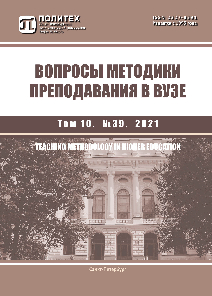Typology of digital problem-solving tasks for teaching foreign languages
The article is aimed at developing a typology of problem tasks based on digital learning tools for language education purposes. The author separates the concept of problem-solving tasks from project-based learning. An overview of problem-solving task structure is presented, in which seven stages of the problem-solving process are distinguished. The correlation between the digital resources and stages of problem solving is consequently established. The proposed typology is based on such task features as the purpose of the problem task, the predominant digital means of coordinating the educational process and the accentuated roles of students. As a result, three types were identified: communicative, analytical and informational. Each type is further divided according to the form of the lesson which depends on the characteristics of synchronicity and asynchrony of communication. In order to determine the properties of the digital problem-solving task types, a questionnaire study was conducted after testing asynchronous tasks in the framework of blended learning. The results allowed identification of the types most suitable for the development of communicative, professional and general professional skills.



